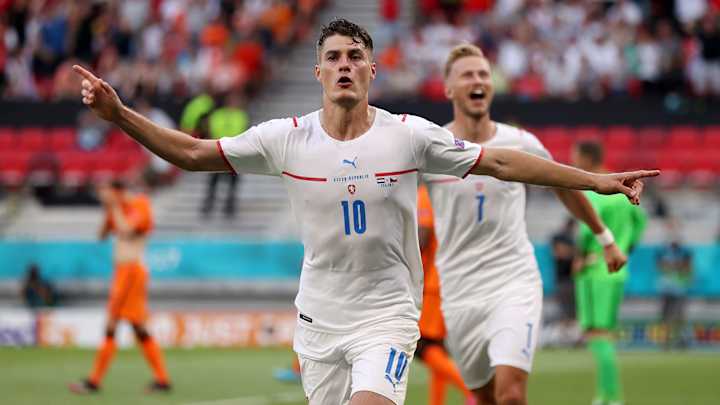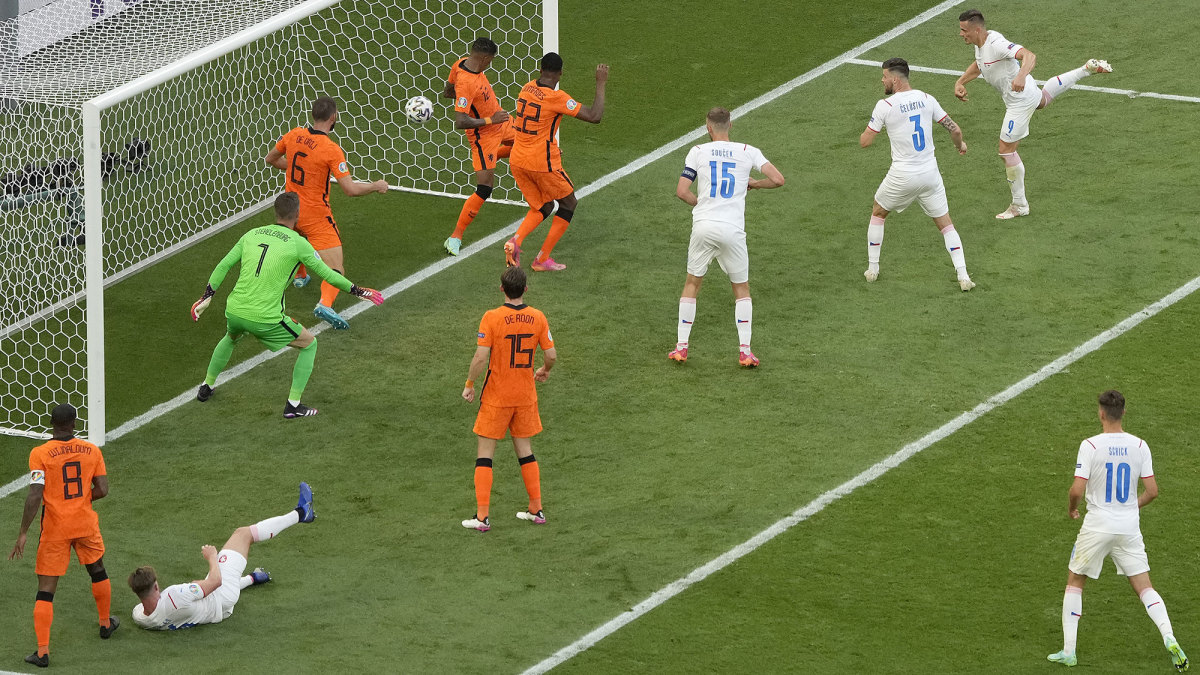Czechs Better on the Balance to Oust Netherlands, Bring Back Memories of Euros Past

The question for the Netherlands after the group stage at Euro 2020 was whether it had just benefited from a straightforward draw or whether the pre-tournament predictions of chaos had been overblown. Sunday's 2-0 defeat to the Czech Republic in the round of 16 provided the answer. The dismissal of Matthijs De Ligt early in the second half was a major factor, but a disciplined and physically imposing Czech Republic side had rattled the Dutch long before that.
The red card should not be used as an excuse. Rather, the Oranje went out because they didn’t have the wit to break down the Czech defense, and because defensively they looked vulnerable to crosses and never seemed to work out a way of stopping deliveries into the box. As they go out having failed to register a shot in the second half and a single shot on target at all—and go home to recrimination and the probable departure of manager Frank De Boer—the Czechs go on to face Denmark in the quarterfinals, a rematch of the 2004 quarterfinals they won, 3–0, 17 years ago to the day.

But as well as what happened on the pitch, this was a game important for other reasons. Netherlands captain Georginio Wijnaldum wore a rainbow armband bearing the slogan “One Love,” an overt reaction to recent homophobic legislation in Hungary (the match was taking place in Budapest). Although the rainbow colors were apparent on the pitchside advertising, there was, slightly surprisingly, no evidence of rainbow flags or banners in the stands.
There had been reports earlier in the day of Hungarian security confiscating rainbow flags from Dutch fans. UEFA, which is already investigating alleged homophobic incidents involving Hungary fans, responded with a statement insisting that “UEFA had earlier today informed the Hungarian Football Federation that that rainbow-colored symbols are not political and that in line with UEFA's Equal Game campaign which aims at fighting against any type of discrimination, including against the LGBTQI+ community, such flags will be allowed into the stadium.” It did, though, acknowledge that fan zones are under the control of local authorities.
There are limits, clearly, as to what influence UEFA (or FIFA) has over local policing, which only makes it even more clear than it was before the need, when hosting rights are allocated, for there to be consideration of the extent to which the prospective host complies to UEFA's (or FIFA's) stated standards on human rights, which would include the absence of discriminatory legislation. In that regard, what has happened in Hungary may just be a foreshadowing of what is to come at the World Cup in Qatar next year.
The game itself produced the first real shock of the tournament. De Boer was not a popular choice to be Netherlands manager. For all his achievements at Ajax, an 85-day stint at Inter Milan, a 77-day stint at Crystal Palace and 18 months at Atlanta United had diminished his credibility and there was a sense when he stepped in after Ronald Koeman took the Barcelona job that he was somebody who was available rather than necessarily desired.

And being the Netherlands, of course, there were tactical disputes. In a country in which some fans demand a 4-3-3 as a matter of faith—even De Boer’s twin brother, Ronald, commented before the tournament that Johan Cruyff would be turning in his grave—the preference for a 5-3-2 caused consternation. Three wins out of three in the group perhaps tempered some of the criticism, but the directness of much of the Dutch play here felt unorthodox to the point of heresy.
Initially, balls over the top to release Memphis Depay or Donyell Malen, or runners from deeper, did create opportunities. The problem was that the approach soon became predictable and the Czechs adjusted, dropping slightly deeper. As the game became increasingly ragged, the Czechs, always dangerous from set plays, began to cause problems in open play as well, as Vladimír Coufal, the right back, repeatedly found space behind the Dutch left wingback Patrick van Aanholt.
But everything hinged on an incident nine minutes into the second half. Within 25 seconds of Malen bursting through and being denied by excellent goalkeeping by Tomáš Vaclík, the tenor of the game was changed as De Ligt, the last defender back, slipped and then scooped the ball away from Patrik Schick with his hand to be sent off (Oddly, the Netherlands' four all-time red cards at the Euros have all come against Czechoslovakia/Czech Republic). The Dutch took off Malen for Quincy Promes and switched to a back four, and the Czechs took control.
Tomáš Vaclík says NO! 🚫
— SI Soccer (@si_soccer) June 27, 2021
The #CZE goalkeeper comes up huge on a 1-v-1 chance for #NED's Donyell Malen, getting his timing down perfectly
(via @ESPNFC)pic.twitter.com/DBtZyJERO3
¡EXPULSADO! ☄️🔴
— TUDN USA (@TUDNUSA) June 27, 2021
El arbitro vuelve a revisar la jugada y expulsa a de Ligt 😱😤#NED 0-0 #CZE#EuroTUDN I #VeranoDeCampeones I #EURO2020
🔴 ¡En vivo!
📲 GRATIS en la app TUDN y @PrendeTV
👉 https://t.co/9xpSZeXkXX pic.twitter.com/g9MQhuxGid
The opener came after 68 minutes, as Antonín Barák’s free kick from the right was headed back across goal by Tomáš Kalas for Tomáš Holeš to head powerfully through three Dutch players on the line. A second arrived 12 minutes later, Holes cutting the ball back for Schick to steer in his fourth goal of the tournament.
This is the Czechs’ first major quarterfinal since Euro 2012, but with this half of the draw opening up, manager Jaroslav Šilhavý will dream of repeating the achievement of 2004 in reaching the semifinals—perhaps even emulating what happened in 1996 and reaching a Wembley final once again. Its combination of ruggedness and neat patterns could unsettle anybody.
More Euro 2020 Coverage:
